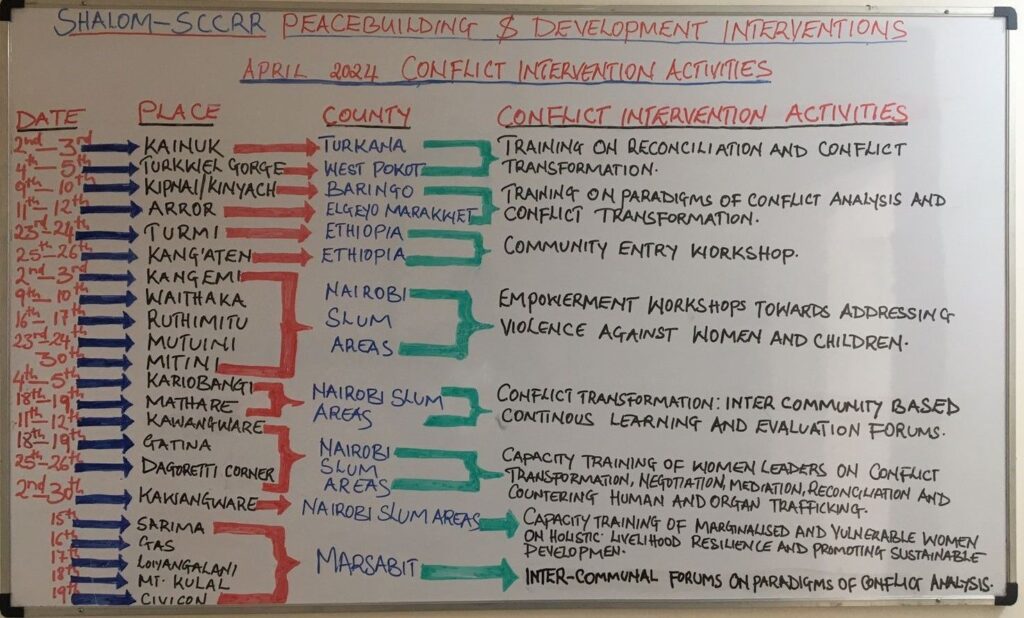Marti is a sub-location in El Barta ward in Samburu North Constituency, Samburu County. The area in the past was inhabited by three ethnic communities; Samburu, Turkana and Pokot. However, due to perennial intractable inter-community conflicts characterized by unremitting livestock raids, banditry and insecurity underpinned by the presence of small arms, the Samburu and the Pokot communities were displaced leaving the area to only the Turkana community. The major conflict causal factors in the region are mainly pegged on the communities’ livelihood (pastoralism), commercialization of livestock raids, competition for natural resources (mainly water, pasture & land), proliferation of modern arms and political supremacy battles among the communities to control the constituency. These intractable conflicts have led to massive deaths, injuries, displacements of people, loss and destruction of learning and health facilities, insecure roads and highway robbery, closure of schools and disruption of development projects.

A Turkana moran herding as he protects his livestock

A group of warriors preparing for a raid
The SCCRR’s intervention strategy in Marti is aimed at rebuilding and restoring the fractured inter-community relations. The strategy is implemented by engaging a wider category of key influential stakeholders in the community as well as the young generations in schools. At the community level, key influential stakeholders are taken through a series of peace trainings aimed at equipping them with vital knowledge and analytical skills of peacebuilding that have enabled them to currently spearhead the drawing and implementation of practical peace related action plans contributing further in positive conflict transformation in their own communities.
With the positive and tangible results with the approach with members of the communities, Shalom saw the value in also involving the school going children in the process of peacebuilding through peace education project. Through Shalom’s Peace Education project, both Marti Primary and Secondary schools have been supplied with learning materials in the form of books, desks, chairs, solar panels and building materials. In addition, SCCRR has built 2 classrooms and 2 latrines for Marti Secondary school. The provision of these materials has enabled the pupils and the students in these schools to learn with comfort; improved the enrollment of pupils and students; increased retention capacity of the children and the teachers in these schools; and improved academic performance of the pupils and students.
SCCRR has also established 2 peace clubs in these schools; have conducted peace education trainings with both peace club members and peace clubs’ patrons; and, guided the peace clubs members in drawing and implementing practical peace-related action plans under the leadership of peace patrons both at the school and community levels. This strategy has contributed in instilling positive change in the children’s values, perceptions, attitudes, beliefs and behaviours hence enabling them to live in tranquility with each other regardless of their ethnic identity and background.

Shalom’s Francis Mwangi engaging a group of Marti Secondary Students
In April and May 2018, Shalom’s team engaged with the pupils and students of the two schools. The members confirmed the fact that whenever inter-community conflict strikes, women and children receive the hard end of the stick. During this period, some pupils and students lose their lives; schools are frequently closed; increase in drop outs; children suffer psychologically trauma; and, lose hope in their own future. Sentiments from some of them underpinned the need for sustainable peace in the area. Moses Lobuin, a class seven pupil remarked that “Every day when I wake up I am afraid that my schooling may be halted by sporadic conflicts that happen in this area. This has been my home, but sometimes I feel I would be safer living in another place.” A worried Mary Akai, a form two student, wandered about the unknown by noting that: “We are scared of what will happen to us in the event that there is a revenge attack from our neighboring communities. Are we going to survive or we will also be killed?” Due to sporadic and persistent conflicts in this area, the young male pupils and students are at great risk of dropping out of school and joining their fellow warriors in raiding and attacking their neighboring Samburu and Pokot communities.

A group photo of Shalom staff and peace club members of Marti Secondary School
During this activity, 90 peace club members from the two schools were in attendance. The main activity achieved its main objective of empowering the peace clubs members with the knowledge and skills of peacebuilding. The peace club members were guided on their roles as the voice of peace in their communities and on how to conduct their peace-related activities in schools, families and their communities. At the end of this activity, the members acknowledged that there is need for them to be in the forefront in contributing in their own small way to peace in their area. They noted that they are have already established pen pal relations with pupils and students from the Pokot and Samburu communities in the neighbouring schools with the aim of initiating peaceful inter-ethnic relations among schools in the region.
SCCRR remains committed to transforming the lives of the people in Marti and other regions by applying an integrative participatory approach where the schools and the communities are involved in the peacebuilding processes. This approach is to be applied in the all our project areas so as to foster peaceful coexistence that in turn will promote socio-economic development in these communities.
Authors:
Ms. Esther Kibe, M.A., B.A. – Head of Communication Department
Mr. Arthur Magero, M.A., B.A. – Head of Peace Education Department
Mr. Francis Mwangi, M.A., B.A. – Head of Monitoring, Evaluation and Learning Department

